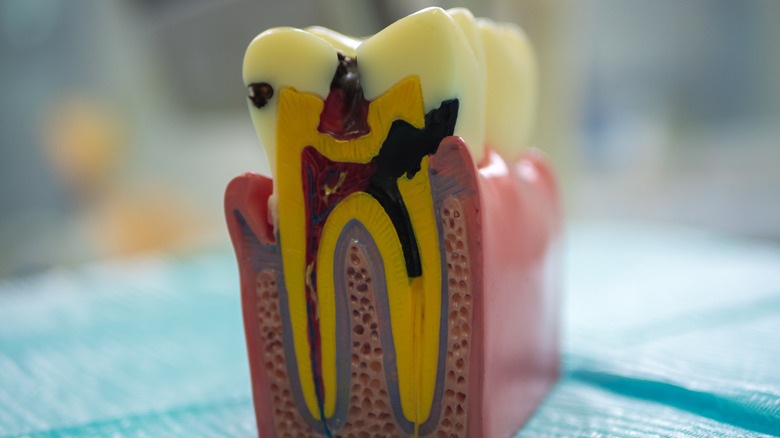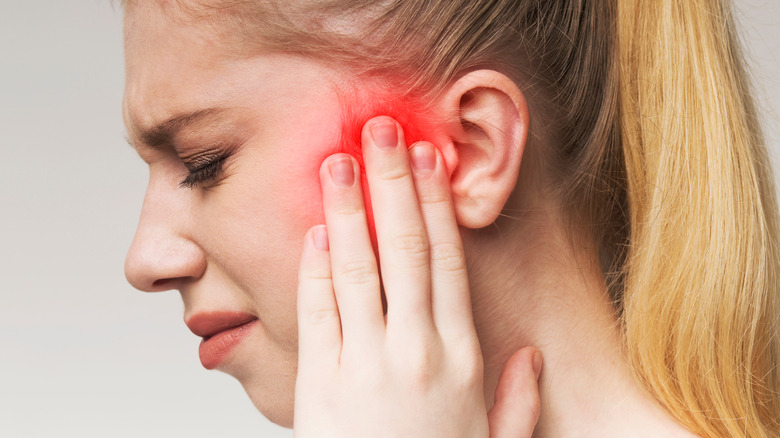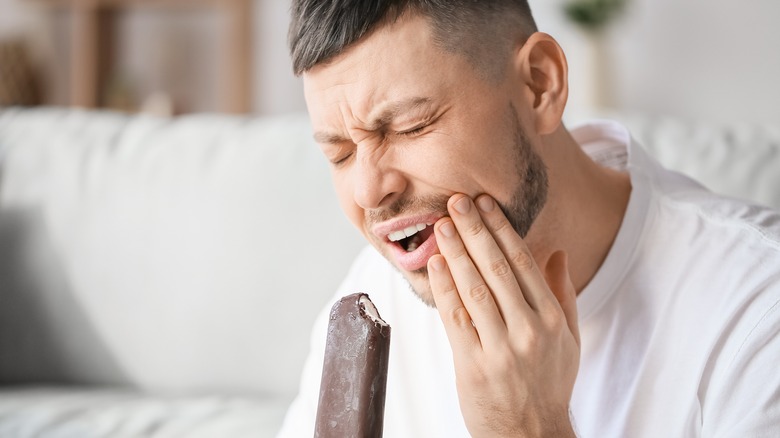What It Means When You Have Teeth Tingling
You're eating a meal when suddenly your teeth begin to tingle. Or perhaps you are watching TV when you feel a weird sensation in your mouth. While this is a strange feeling, it may or may not be a cause for concern. Many things can cause pain in your teeth; some may require a trip to the dentist, while others can be resolved at home.
It may seem odd that your teeth would feel something in the first place. Aren't they just solid enamel? That's not the case. They are made of layers of material connected to a bundle of nerves and blood vessels that provide nutrients to your teeth (per Dragonfly Dental).
Teeth are more complicated than you may think, so narrowing down the cause of painful teeth can be difficult. If you're ever worried, a trip to the dentist may be the best thing to calm your fears. However, certain things can commonly cause this symptom.
Overbrushing
Teeth are not made of just one material. Each tooth is composed of four layers: the enamel, dentin, cementum, and pulp, according to Houston Pediatric Dentist. The outermost layer, the enamel, is an extremely hard substance. But, if you are brushing your teeth too hard, you may be damaging your tooth enamel. The enamel protects the dentin, and the more of it that gets removed, the higher the chance the dentin will become irritated (per Dental Smile).
High or low temperatures, acidic foods or drinks, and bacteria can attack the dentin underneath the enamel, irritating the tooth's nerves. This irritation can cause tingling in your teeth.
If you think you may be overbrushing, Colgate says the best way to protect your tooth enamel is to use a soft-bristled toothbrush, wait 60 minutes after eating to brush, confirm that your toothbrush bristles aren't flattened or frayed, and don't use an abrasive toothpaste.
Cavities
Cavities may occur when the hard enamel of your teeth becomes permanently damaged. Mayo Clinic explains that this can be caused by eating sugary or starchy foods and not brushing well enough. Bacteria can feed on these food residues forming a plaque coating on your teeth, and the acidity of the plaque then begins to erode the enamel.
When the tooth begins to decay, cavities will form, causing tiny holes in the tooth that can go all the way down to the nerves of your teeth. When the nerves are exposed, your teeth can become extremely sensitive, according to Healthline. Air, cold water, or other irritants can touch the tooth's nerves, causing your teeth to ache or feel sensitive. You may also have visible holes or pits in your teeth or black, brown, or white stains on the tooth surface, says Mayo Clinic.
Dentists fix cavities by filling the damaged areas with certain materials. Fillings are usually made of gold, amalgam, composite, or glass ionomer (via Medical News Today).
Pulpitis
WebMD explains that pulpitis happens when the inner layer of your teeth, known as the dental pulp, becomes inflamed. This layer is made of nerves, blood vessels, and connective tissue. The inflammation can occur due to cavities, cracked teeth, or other reasons.
Pulpitis comes in two forms: reversible and irreversible. It can be challenging to distinguish between the two without a dentist looking at your teeth. However, as the names suggest, reversible pulpitis is only mild inflammation, and people experience short-term pain. Also, a dentist can usually save the tooth with treatment. Irreversible pulpitis means significant inflammation has spread to the nerves (via MedicalNewsToday). This level of inflammation often leads to a root canal or emergency dental care to remove the tooth.
Healthline says it is essential to consult a dentist if you have pulpitis; it can spread to other areas of your body without proper treatment, including your sinuses, jaw, or brain.
Trigeminal neuralgia
Trigeminal neuralgia is a condition that affects the trigeminal nerve, the nerve that allows you to feel sensations in your face, says Mayo Clinic. Because this condition affects the nerves within your face, it can also cause tingling in your teeth (per Healthline).
You may have this condition if you're experiencing sudden jolts on one side of your face that feel similar to an electric shock. It may cause pain from actions as simple as brushing your teeth or applying makeup. According to the American Association of Neurological Surgeons, the attacks associated with trigeminal neuralgia can start short and mild. However, if it is not treated, it can progress to being extremely painful.
This condition is relatively uncommon, however, and it occurs more often in women than men and is more likely in people age 50 or older (via Mayo Clinic). A form of trigeminal neuralgia is also linked to multiple sclerosis.
Dentin hypersensitivity
One of the most common causes of tingling teeth is dentin hypersensitivity. A simpler term is tooth sensitivity. This condition occurs when your teeth become very sensitive to certain stimulants, such as cold water, hot food, or chilly air. Healthline notes that even biting down too hard can cause sudden sensitivity.
Usually, dentin hypersensitivity can occur when the tooth's enamel has become worn down through eating acidic foods, overbrushing, or not brushing enough, explains Mayo Clinic. Of course, tooth sensitivity can be caused by other factors, like a cavity, cracked tooth, gum disease, or a worn-down filling.
According to Mayo Clinic, your dentist may treat sensitive teeth with fluoride treatments, bonding, gum grafts, or a root canal. But what if you don't want to head to the dentist? Healthline suggests several home remedies that may help with tooth sensitivity, including desensitizing toothpaste, a saltwater rinse, a softer toothbrush, or a mouthguard at night if you are prone to grinding your teeth.






